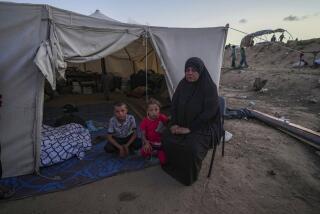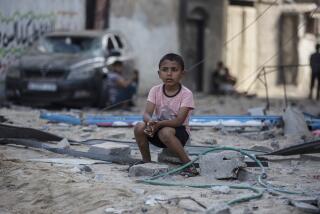A Chronic Search for Security
- Share via
Pakistan’s creation, in the rush to independence for British India after World War II, won reluctant acceptance from all parties as perhaps the only way to preserve communal peace. Much academic writing in recent years turns on the question of what, exactly, Pakistan’s founder, a determined lawyer named Muhammad Ali Jinnah, had in mind when he called for a special place (“Pakistan,” meaning “Abode of the Pure”) for the “Muslim nation” then dwelling within the confines of British India .
Muslims rightly had felt shut out of the various Congress Party state governments created under the 1935 British system of elected self-rule. But many among the same Muslim minority recognized, even before the dreadful toll of massacres in Punjab and Bengal when partition finally occurred, that the “vivisection of British India” (as one account put it) might go horribly wrong, entrenching hostility for generations.
They were right. Pakistan’s dilemma today arises from its chronic search for security against the larger Indian neighbor, a quest taking on a special urgency after the 1971 loss of East Pakistan, today’s Bangladesh. The religious rationale no longer seems so clear; indeed, India’s 120 million Muslims give that country almost as many co-religionists as those in Pakistan.
Nor has the garrison state, maintained for its security, done much to advance a common nationality. Three wars--two of which erupted in the disputed princely state of Jammu and Kashmir--have entrenched clever, self-interested security bureaucracies in both countries. And whereas India’s oft-derided “indigenization” drive, whether in atomic energy or in aerospace technology, has yielded a vast, government-funded structure of basic research and production, Pakistan had to build a scientific establishment on the cheap.
So, while the more adroit at international trade, Pakistan’s nuclear development program always has had more of a snatch-and-grab quality to it--one reason why Western intelligence agencies know more about Pakistani nuclear capability than they do about India’s.
But the terrible dilemma over testing--India’s explosions in May forced Pakistani Prime Minister Nawaz Sharif’s hand--is only a part of the problem. (The Japanese promised to shift their entire aid program from India to Pakistan if Sharif chose not to test.) Indeed, Pakistan’s problems have now become cumulative as debt servicing default looms nearer.
The country is suffering from what seems an insoluble malaise--the inability to consolidate a democratic order; an inability to sustain Pakistan’s founding fervor; an impatience in its rapidly burgeoning and young but too often illiterate population for material gains.
At one level, Pakistan lacks for little. Take its energy resources, especially natural gas: Properly harnessed and linked to Indian markets, these could power the Western subcontinent. Pakistan’s hydroelectric potential has also been staring energy planners in the face for 50 years. Meanwhile, Pakistan’s human talent remains superb, as anyone in the West who deals with the country knows very well.
But at another level, Pakistan lacks a great deal. Where, as in India’s southern state of Kerala, can one find female literacy rates of 96% or more? Of half that? Or even a quarter of that? Pakistan’s Western admirers find it hard to square that human talent with a tenacious retention of feudal attitudes toward women. The Clinton administration’s description of Pakistan several years ago as a “moderate Islamic democracy” sounded strange.
It seems stranger now, with the risk of foreign debt default rising sharply since the suspension of multilateral aid in the wake of the nuclear tests. The immediate pressure is acute, with reportedly less than three weeks’ import cover and reserves insufficient to cover the estimated $1.7 billion owed over the next eight weeks to foreign commercial banks and to the World Bank and International Monetary Fund.
At this juncture, Pakistan’s unfortunate association with terror has taken on new menace, compounding sentiment already flattened by economic mismanagement, and especially by the failure of tax reform and by the government’s introduction of a dual exchange rate in direct defiance of the IMF.
Just as we have discovered in the East Asian crisis, Pakistan’s basic problems are political in nature. Pakistani friends tell me that their country just hasn’t managed to make the leap to modernity. They say that their land remains little more than a patchwork of intensely regional feuds--for which a shared Islam means little or nothing. They say that the only national unity comes in the guise of grievance, whether from the “unfinished business of 1947” (code words for India’s occupation of much of Kashmir) or from perceived abandonment by the U.S. since the end of the Cold War. In grievance, alas, their shared Islam does provide a common rhetoric.
Commenting on Pakistan’s nuclear detonation in May, Sharif said the “next 50 years would be different for Pakistan.” The immediate signs do not bear out his optimism.
More to Read
Sign up for Essential California
The most important California stories and recommendations in your inbox every morning.
You may occasionally receive promotional content from the Los Angeles Times.













